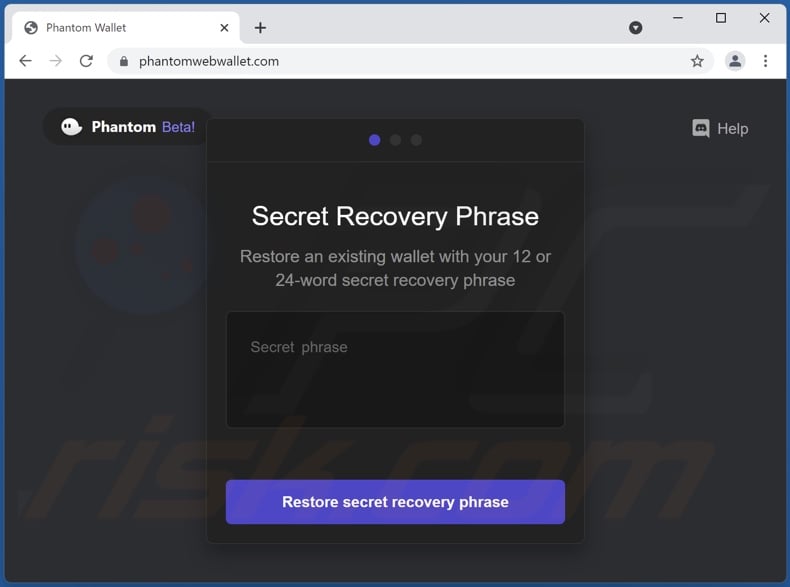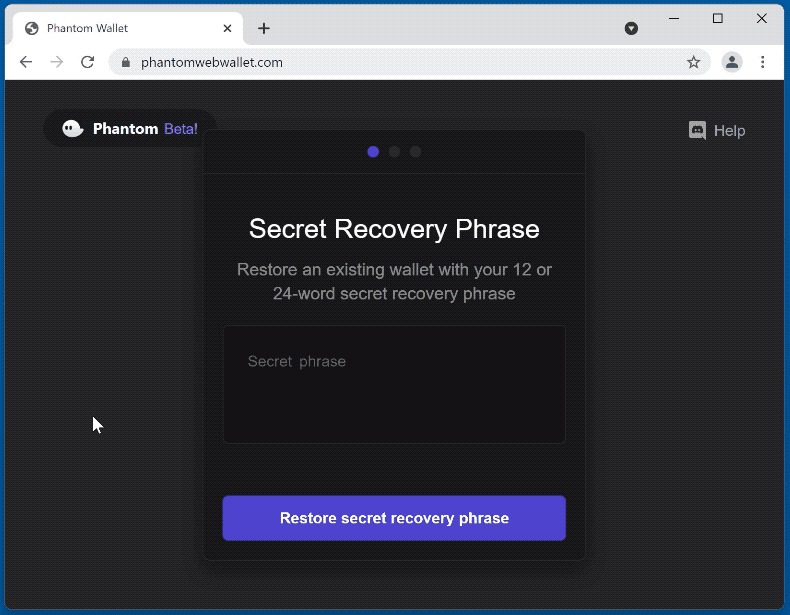Avoid getting scammed by fake "Phantom Wallet Recovery" websites
Phishing/ScamAlso Known As: Phantom Wallet Recovery scam website
Get free scan and check if your device is infected.
Remove it nowTo use full-featured product, you have to purchase a license for Combo Cleaner. Seven days free trial available. Combo Cleaner is owned and operated by RCS LT, the parent company of PCRisk.com.
What is "Phantom Wallet Recovery" scam?
"Phantom Wallet Recovery" is a phishing scam promising users access recovery to their Phantom cryptocurrency wallets. Instead, the scheme records the wallet credentials provided to it. With this information in their possession, the cyber criminals behind the scam can steal the exposed cryptowallets.

"Phantom Wallet Recovery" scam overview
This scam aims to obtain victims' cryptowallet credentials (e.g., passphrases, recovery phrases, etc.). The scheme targets Phantom digital wallets that are designed to store Solana (SOL) cryptocurrency.
Cyber criminals can use the credentials acquired through this scam to steal the corresponding wallets and the funds stored therein. Furthermore, because cryptocurrencies are virtually untraceable - any unauthorized transactions are essentially irreversible.
| Name | Phantom Wallet Recovery scam website |
| Threat Type | Phishing, Scam, Social Engineering, Fraud |
| Fake Claim | Scam promises Phantom Wallet recovery. |
| Related Domains | phantomwebwallet[.]com |
| Detection Names | AlienVault (Malicious), CRDF (Malicious), CyRadar (Malicious), ESET (Phishing), Fortinet (Phishing), Google Safebrowsing (Phishing), Full List Of Detections (VirusTotal) |
| Distribution methods | Compromised websites, rogue online pop-up ads, potentially unwanted applications. |
| Damage | Loss of sensitive private information, monetary loss, identity theft, possible malware infections. |
| Malware Removal (Windows) |
To eliminate possible malware infections, scan your computer with legitimate antivirus software. Our security researchers recommend using Combo Cleaner. Download Combo CleanerTo use full-featured product, you have to purchase a license for Combo Cleaner. 7 days free trial available. Combo Cleaner is owned and operated by RCS LT, the parent company of PCRisk.com. |
Cryptocurrency scam examples
There are many cryptocurrency-centered scams on the Web. The most common types target cryptowallet credentials (e.g., "MetaMask Holders Rewards", "Terra Wallet scam", etc.) and those that promise to give users cryptocurrency in exchange for donations of said currency (e.g., "BITCOIN DONATE", "SOLANA (SOL) Giveaway", etc.). Regardless of what such scams offer, their sole goal is to generate revenue at user expense.
How did potentially unwanted applications install on my computer?
Deceptive and other suspect webpages are often accessed inadvertently. These pages can be promoted through intrusive advertisements and sites that use rogue advertising networks. However, such pages can also be force-opened by PUAs (Potentially Unwanted Applications) installed onto the system. They appear legitimate, but they typically have harmful abilities (e.g., adware, browser hijackers, etc.).
This software can infiltrate systems without express user permission. It can be downloaded/installed alongside other programs - this marketing method is called "bundling". Rushed downloads/installations increase the risk of allowing bundled content into the system.
Additionally, some intrusive adverts can stealthily download/install PUAs - when clicked on. Unwanted apps can have "official" download webpages as well.
How to avoid installation of potentially unwanted applications?
It is recommended to research software and download it from official/verified channels. Untrustworthy sources, e.g., unofficial and freeware websites, Peer-to-Peer sharing networks, etc. - commonly offer bundled content.
When downloading/installing, it is advised to read terms, study options, and use the "Custom/Advanced" settings to opt-out from all supplements. It is just as important to exercise caution when browsing due to the prevalence of scams and other dubious material on the Internet. Intrusive ads appear innocuous yet redirect to questionable sites (e.g., pornography, gambling, etc.).
If ads/redirects of this kind are encountered, the system must be checked and all suspicious applications and browser extensions/plug-ins detected - immediately removed. If your computer is already infected with PUAs, we recommend running a scan with Combo Cleaner Antivirus for Windows to automatically eliminate them.
The appearance of "Phantom Wallet Recovery" scam (GIF):

Instant automatic malware removal:
Manual threat removal might be a lengthy and complicated process that requires advanced IT skills. Combo Cleaner is a professional automatic malware removal tool that is recommended to get rid of malware. Download it by clicking the button below:
DOWNLOAD Combo CleanerBy downloading any software listed on this website you agree to our Privacy Policy and Terms of Use. To use full-featured product, you have to purchase a license for Combo Cleaner. 7 days free trial available. Combo Cleaner is owned and operated by RCS LT, the parent company of PCRisk.com.
Quick menu:
- What is Phantom Wallet Recovery scam website?
- How to identify a pop-up scam?
- How do pop-up scams work?
- How to remove fake pop-ups?
- How to prevent fake pop-ups?
- What to do if you fell for a pop-up scam?
How to identify a pop-up scam?
Pop-up windows with various fake messages are a common type of lures cybercriminals use. They collect sensitive personal data, trick Internet users into calling fake tech support numbers, subscribe to useless online services, invest in shady cryptocurrency schemes, etc.
While in the majority of cases these pop-ups don't infect users' devices with malware, they can cause direct monetary loss or could result in identity theft.
Cybercriminals strive to create their rogue pop-up windows to look trustworthy, however, scams typically have the following characteristics:
- Spelling mistakes and non-professional images - Closely inspect the information displayed in a pop-up. Spelling mistakes and unprofessional images could be a sign of a scam.
- Sense of urgency - Countdown timer with a couple of minutes on it, asking you to enter your personal information or subscribe to some online service.
- Statements that you won something - If you haven't participated in a lottery, online competition, etc., and you see a pop-up window stating that you won.
- Computer or mobile device scan - A pop-up window that scans your device and informs of detected issues - is undoubtedly a scam; webpages cannot perform such actions.
- Exclusivity - Pop-up windows stating that only you are given secret access to a financial scheme that can quickly make you rich.
Example of a pop-up scam:

How do pop-up scams work?
Cybercriminals and deceptive marketers usually use various advertising networks, search engine poisoning techniques, and shady websites to generate traffic to their pop-ups. Users land on their online lures after clicking on fake download buttons, using a torrent website, or simply clicking on an Internet search engine result.
Based on users' location and device information, they are presented with a scam pop-up. Lures presented in such pop-ups range from get-rich-quick schemes to fake virus scans.
How to remove fake pop-ups?
In most cases, pop-up scams do not infect users' devices with malware. If you encountered a scam pop-up, simply closing it should be enough. In some cases scam, pop-ups may be hard to close; in such cases - close your Internet browser and restart it.
In extremely rare cases, you might need to reset your Internet browser. For this, use our instructions explaining how to reset Internet browser settings.
How to prevent fake pop-ups?
To prevent seeing pop-up scams, you should visit only reputable websites. Torrent, Crack, free online movie streaming, YouTube video download, and other websites of similar reputation commonly redirect Internet users to pop-up scams.
To minimize the risk of encountering pop-up scams, you should keep your Internet browsers up-to-date and use reputable anti-malware application. For this purpose, we recommend Combo Cleaner Antivirus for Windows.
What to do if you fell for a pop-up scam?
This depends on the type of scam that you fell for. Most commonly, pop-up scams try to trick users into sending money, giving away personal information, or giving access to one's device.
- If you sent money to scammers: You should contact your financial institution and explain that you were scammed. If informed promptly, there's a chance to get your money back.
- If you gave away your personal information: You should change your passwords and enable two-factor authentication in all online services that you use. Visit Federal Trade Commission to report identity theft and get personalized recovery steps.
- If you let scammers connect to your device: You should scan your computer with reputable anti-malware (we recommend Combo Cleaner Antivirus for Windows) - cyber criminals could have planted trojans, keyloggers, and other malware, don't use your computer until removing possible threats.
- Help other Internet users: report Internet scams to Federal Trade Commission.
Frequently Asked Questions (FAQ)
What is a pop-up scam?
Pop-up scams are deceptive messages/sites designed to trick users into performing specific actions, e.g., revealing sensitive data, making monetary transactions, downloading/installing (likely untrustworthy or malicious) software, and so forth.
What is the purpose of a pop-up scam?
The end-goal of pop-up scams is almost exclusively to generate revenue for the cyber criminals behind them. Profit can be made by using information disclosed by victims for illegal activities or selling it to third-parties, promoting nonoperational or unwanted programs, proliferating malware, and so on.
I have provided my personal information when tricked by a pop-up scam, what should I do?
If you have provided account credentials - immediately change the passwords/passphrases of all potentially compromised accounts and inform their official support. And if you've disclosed other private information (e.g., ID card details, credit card numbers, etc.) - contact the relevant authorities without delay.
Why do I encounter fake pop-ups?
Pop-up scams are run on various deceptive websites. These sites are usually accessed via mistyped URLs or redirects caused by other rogue pages, browser notifications/ intrusive adverts, or installed harmful software.
Will Combo Cleaner protect me from pop-up scams?
Combo Cleaner can scan the websites you visit. It also issues warnings if the visited sites are detected as deceptive or malicious. Additionally, Combo Cleaner can restrict access to such websites.
Share:

Tomas Meskauskas
Expert security researcher, professional malware analyst
I am passionate about computer security and technology. I have an experience of over 10 years working in various companies related to computer technical issue solving and Internet security. I have been working as an author and editor for pcrisk.com since 2010. Follow me on Twitter and LinkedIn to stay informed about the latest online security threats.
PCrisk security portal is brought by a company RCS LT.
Joined forces of security researchers help educate computer users about the latest online security threats. More information about the company RCS LT.
Our malware removal guides are free. However, if you want to support us you can send us a donation.
DonatePCrisk security portal is brought by a company RCS LT.
Joined forces of security researchers help educate computer users about the latest online security threats. More information about the company RCS LT.
Our malware removal guides are free. However, if you want to support us you can send us a donation.
Donate
▼ Show Discussion